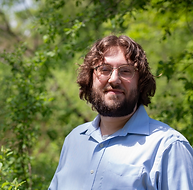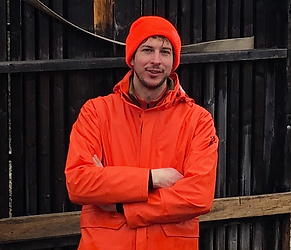Ecosystem Ecology Lab
We are a diverse group of ecologists with expertise in mathematical modelling, geographic information systems, and field-based research.

Dr. Shawn J. Leroux
Professor
Department of Biology
Memorial University of Newfoundland
45 Arctic Ave
St John’s, NL, CANADA
A1C 5S7
Office: CSF-4344
Office tel.: 709-864-3042
Lab tel.: 709-864-7504
Email: sleroux (at) mun (dot) ca
Photo credit: David Howells
EDUCATION:
PhD Ecology (2010)
Department of Biology, McGill University
MSc Conservation Biology (2006)
Department of Renewable Resources, University of Alberta
BA Environmental Studies (2003)
Department of Geography, University of Ottawa
I am an ecosystem ecologist with a strong interest in conservation ecology. I study the relationship between biodiversity and ecosystem functioning. I am particularly interested in how organism, energy, and material fluxes among ecosystems (e.g. aquatic-terrestrial ecotone) and up and down food webs impacts the functioning of meta-ecosystems.
Postdoctoral Fellows

EDUCATION:
BSc Environmental Geoscience
and Philosophy (2015)
Boston College
MSc Environmental Science (2018)
Vanderbilt University
PhD Ecology and Environmental
Science (2024)
Yale School of the Environment
RESEARCH INTERESTS:
I am an ecosystem ecologist and conservation ethicist interested in advancing our understanding of the natural world. My work focuses on how animals interact with and shape the ecosystems they inhabit. My current projects examine the role of large ungulates—such as elk, caribou, and mule deer—in elemental cycling, along with how restoring large mammal communities affects ecosystem function. My projects span various northern ecosystems, exploring questions like how caribou affect nitrogen cycles on a small island off Newfoundland or how Rewilding grazers shape patterns of biodiversity. I also have an interest in conservation ethics, where I use tools and frameworks from philosophy to interrogate the underlying norms of conservation and ecology. I believe integrating philosophy into ecology can help us do better science and do science better.
*co-supervised by E. Vander Wal
Dr. Kyleisha Foote

EDUCATION:
BSc Geography (2009)
Massey University, NZ
Master Environmental
Management (2014)
Massey University, NZ
PhD Geography, Urban &
Environmental Studies (2024)
Concordia University
RESEARCH INTERESTS:
I am an environmental scientist with broad research interests spanning fish habitat, fluvial geomorphology, sustainable land-use practices, and the social dimensions of environmental change. My work focuses on freshwater fish ecology and ecosystem restoration, approached from a large-scale, landscape perspective. Drawing on interdisciplinary techniques from hydro-geomorphology, ecology, and conservation science, I aim to understand the complex interactions between physical processes, ecological systems, and human activities. I am particularly committed to ethical approaches to conservation that consider animal rights and welfare, and I view science communication as a vital tool for connecting research with public understanding and decision-making. Currently, I am modelling Atlantic salmon spawning habitat to guide targeted restoration efforts in freshwater systems. This work combines ecological data with geomorphological analysis to predict the location and extent of available spawning habitat.
*co-supervised by C. Purchase
Dr. Pierce McNie

EDUCATION:
BSc Ecology/Zoology (2013)
Massey University, NZ
MSc Ecology (2015)
Massey University, NZ
PhD Environmental Sciences
(2024)
Universite du Quebec a Montreal
RESEARCH INTERESTS:
I am an ecosystem and community ecologist interested in how species interactions, human activities, and natural disturbance shape the large scale ecological patterns we see today. Coming from a background of both freshwater and terrestrial ecology, my interests are broad and span multiple ecosystems. My current work combines multispectral drone and satellite imagery, LiDAR imagery, and field data to understand how preventing spruce budworm outbreaks may influence carbon cycling in the boreal forest. I am also using modelling approaches to question whether preventing such disturbances may have other impacts.
PhD Students
Sean Basquill

EDUCATION:
BSc Biology (1992)
Concordia University
MSc Biology (1996)
Centre for Wildlife and Conservation
Biology
Acadia University
RESEARCH INTERESTS:
My professional employment has largely been field-based and I have been fortunate to survey some of the most spectacular and ecologically interesting places in Atlantic Canada. These experiences have inspired my interest in the factors shaping ecosystem diversity, distribution, and persistence. I am fascinated by ecological patterns and mechanisms of change. My research is focused on ecosystem response to anthropogenic land use and climatic drivers. I am developing models to predict how these drivers affect ecosystem degradation and vulnerability. My research findings will be applied to help enable more scientifically informed biodiversity conservation assessments and policies in Nova Scotia, Canada.
*Part-time
Adam Meyer

EDUCATION:
BSc Biological, Biomedical &
Life Sciences (2013)
McGill University
MSc Ecology (2016)
Queen's University
RESEARCH INTERESTS:
I hope to discover how large herbivores such as moose change and contribute to the functioning of boreal ecosystems, especially in concert with large-scale forest disturbances such as insect outbreaks. Newfoundland has a long history of over-abundant moose populations and large outbreak cycles of spruce budworm and is also a global hotspot of friendly people and general good will, making it an ideal location for this work. I will use a combination of field work and mathematical modelling to disentangle the direct and indirect effects of moose browsing on carbon and nutrient cycling between aboveground and belowground communities. This work will contribute to boreal wildlife and forest management by broadening our fundamental understanding of ecosystem elemental cycling and the role of animals within it.

RESEARCH INTERESTS:
My research interests focus on wildlife ecology and conservation from local to global scales. I work from whole organisms to communities to understand how species respond to human and natural drivers. My doctoral research aims to answer the overarching question: how does environmental change constrain seabird energetics across space and time? Through coupling fieldwork with timeseries and powerful modelling frameworks (e.g., Niche Mapper, Dynamic Energy Budget Modelling), I hope to expose the seabird species and populations with the greatest energetic limitations to past and future environmental change.
*part-time and co-supervised by Amanda Bates
EDUCATION:
BSc Marine Biology with
Oceanography (2017) University of Southampton
MSc Marine Biology (2020)
Memorial University
Alex Arkilanian

EDUCATION:
BSc Biology (2018),
McGill University
MSc Biology (2021)
McGill University
RESEARCH INTERESTS:
I'm drawn to questions related to complexity and stability especially when they involve the use of advanced computational tools and GIS. The questions I hope to answer in my time at EEL revolve around the largely overlooked role of decomposition in supporting ecosystems through time and space. In some well-studied systems, like the coastal forests where Pacific salmon spawn, we know that the movement of nutrients in the form of carcasses is essential for species persistence across ecosystem boundaries. My work looks to further this discussion across more diverse ecosystems. I hope this research helps us to better appreciate the delicate balance between life’s end and its role in ensuring the survival of others, especially in a world changing so rapidly.
Mikael Ranta

EDUCATION:
BSc Fisheries and Wildlife
Management (2021)
Lake Superior State University
MSc Biology (2023)
University of Nebraska at
Kearney
RESEARCH INTERESTS:
My research interests are centered around the exploration and investigation of bottlenecks that limit freshwater productivity of wild Atlantic salmon in Newfoundland, and the effectiveness of potential ecosystem restoration/enhancement. My research is part of a larger collaborative project aimed at predicting Atlantic salmon spawner capacity, juvenile densities, and food resources at the watershed scale. I will be using in situ stream site data to provide information towards these objectives, with an emphasis towards water chemistry, aquatic macroinvertebrate community composition, and juvenile densities, age, and dietary analysis components. This work will contribute towards furthering knowledge aimed at aiding Atlantic salmon management, particularly in oligotrophic systems.
* co-supervised by C. Purchase
MSc Students
Ava Hart

EDUCATION:
BSc (2024) Environment and
Natural Resources
University of New Brunswick
RESEARCH INTERESTS:
I am interested in using telemetry to understand the movement patterns and habitat use of wildlife to support conservation. My current research applies radio telemetry to track the freshwater upstream migration patterns of Atlantic salmon to a) better understand the role of biological traits such as fork length, fat content, and sex on upstream migration distance, overwinter survival, and outmigration timing; and b) locate critical spawning habitats to support conservation strategies.
* co-supervised by C. Purchase
Leeya Nagpal

EDUCATION:
BSc (2025) Biology
McGill University
RESEARCH INTERESTS:
I’m very interested in ecosystem dynamics as a whole, and especially the role of large mammals. In Newfoundland specifically, the dense moose population makes for a very interesting study system! I hope to use both empirical data and modelling to investigate the role of moose on nutrient cycling in both terrestrial and aquatic systems.
Research technicians
Niels van Miltenburg

*co-supervised by C. Purchase